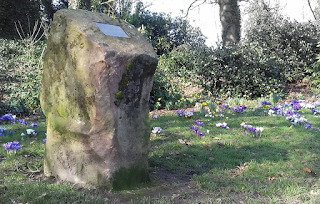The 150 tree whips we agreed to plant were either Alder or Goats' willow, both native varieties which sustain wildlife. Willows in particular are an excellent caterpillar food for many types of moth. Both tree types like wet ground to thrive so the boggiest areas of the fields were ideal spots. Indeed we already had some willow and alder in the largest copse which regularly gets flooded. These trees help to soak up a lot of excess rainwater, so of benefit to us as well as the insects.
Despite heavy rain the day before, we wrapped up warm and wellies on, we trudged out with our spades to start planting. The Council had provided the tree whips, stakes and netting to give the trees the best possible chance of getting established. The netting will also help to prevent the whip being mown over once the grass starts being cut regularly. Neil had stated that they would leave these areas for the grass to grow longer which is also of benefit to wildlife, part of their aim to increase biodiversity. To be fair, the ground is so wet in these aeas that mowing is virtually impossible anyway.
 |
| Councillor Allan Brame came to say hello. |
About 12 of us worked for a good two hours planting, staking and netting the tree whips. Luckily the rain stayed off and by 12 noon we had completed our task and all the tree whips were in the ground. We headed back to the Rose Garden to warm up with hot drinks and biscuits. A well deserved treat for all the very muddy work. There are another 100 tree whips which the Council will plant on the other side of Duck Pond Lane. Native Hawthorn, Blackthorn and perhaps some Birch.
A few of our Friends group have since been on a willow weaving course, with a view to being able to coppice some willow in the years to come to make plant supports for the Long Border. We may even build a living willow tunnel on the Oxton Fields for local children to play in. Watch this space!





